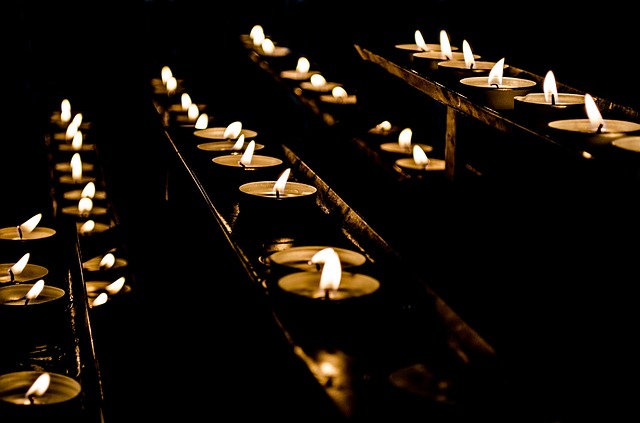 Memorial candles
Memorial candles [Ed. Note: I chose to publish this entry in the blog for the week leading up to Yom Kippur because the Yizkor (Memorial) service on Yom Kippur is so often a major focus in many communities. This article speaks to how memory may be fraught, and not always what we might picture. — JB]
Whether it is Yizkor or just an ordinary service, the prayers before reciting the Kaddish can make some grievers feel even more rotten instead of better. What if a mother or father was not particularly one for whom “we recall the joy of their companionship”? What if “their memory” does not exactly bring “strength and blessing?” I remember in rabbinic school wrestling with the meaning of the Fifth Commandment for those who have or did have abusive parents. How can one be good to oneself, which is a mitzvah, yet honor such a parent?
For grievers of such parents, the idea of grieving feels paradoxical. It seems straightforward enough and certainly painful enough to grieve a parent whose memories of their goodness sustains you. But a neglectful or downright hurtful mother or father elicits enough loads of guilt and anger to go round. And sadness is more about the protection or help or advice or love that parent did not provide; about the parent you never had. Thus, condolences and standard prayers before the Kaddish hardly bring comfort. Instead they are a jarring reminder of how your parent shortchanged you.
The definition a health professional gives to grieving is “reaction to the loss.” That is a broad enough definition to cover all situations. Still, how to start going about it is much more puzzling to a mourner of troubled parents. What does it mean to sit shiva for such a parent? What does it mean to recite the Kaddish for them? To me, the prepositon “for” suggests doing a ritual or prayer as an act of goodness, appreciation and love. And of course we use the expression “grieving for” so-and-so.
It seems odd to say under such circumstances, that “I am grieving for my mother.” I think part of successful grieving is portraying the process to oneself as honestly and accurately as possible. Otherwise you will hinder the purpose of grieving in the first place, which is to allow all the feelings, great and small, peaceful and turbulent, joyful and gloomy, an open path for release. Somehow saying “grieving for” sounds like the tears are ready to roll at almost any provocation and that you miss them if not for how they were at the time of their passing, then at least for how they were in better days.
I think honesty in how we use language is one step in figuring out and expressing how we really feel, which is what healthy grieving is all about. As a symbolic baby step towards this goal, I am inventing a new expression for those who did not have parents who could be caring and be there for you:
“I am grieving against my mother.”
Methinks I have found a solution for us unconventional grievers. Let me know if the sentence below helps to express to yourself how you really feel about that louse. Does saying it this way give you permission to stop censoring those less socially acceptable emotions?
“I am grieving against my father.”
Rabbi and board certified Chaplain Karen B. Kaplan is author of Encountering the Edge: What People Told Me Before They Died (Pen-L Publishing, 2014) a series of true anecdotes capped with the deeper reasons she chose her vocation. She has also recently published a collection of science fiction stories, Curiosity Seekers (Createspace Independent Publishing, 2017). She has submitted multiple entries published in Expired And Inspired.

___________
GAMLIEL INSTITUTE COURSES
LOOKING FORWARD: UPCOMING COURSE
The Gamliel Institute will be offering course 5, Chevrah Kadisha: Ritual, Liturgy, & Practice (Other than Taharah & Shmirah), online, afternoons/evenings, in the Winter semester, starting roughly in January, 2018. This is the core course focusing on ritual, liturgy, practical matters, how-to, and what it means (for everything other than Taharah and Shmirah, which are covered in course 2).
CLASS SESSIONS
The course will meet online for twelve Tuesdays (the day will be adjusted in any weeks with Jewish holidays during this course).
Information on attending the course preview, the online orientation, and the course will be announced and sent to those registered. Register or contact us for more information.
REGISTRATION
You can register for any Gamliel Institute course online at jewish-funerals.org/gamreg. A full description of all of the courses is found there.
For more information, visit the Gamliel Institute website, or at the Kavod v’Nichum website. Please contact us for information or assistance by email info@jewish-funerals.org, or phone at 410-733-3700.
____________________
Gamliel Café
Gamliel Students are invited to an informal online monthly session on the 3rd Wednedsays of most months. Each month, a different person will offer a short teaching or share some thoughts on a topic of interest to them, and those who are online will have a chance to respond, share their own stories and information, and build our Gamliel Institute community connections. This initiative is being headed up by Rena Boroditsky and Rick Light. You should receive email reminders monthly. The next scheduled session of the Gamliel Café is October 18th.
If you are interested in teaching for a session, you can contact us at j.blair@jewish-funerals.org, or info@jewish-funerals.org.
____________________
Gamliel Graduate Courses
Graduates of the Gamliel Institute, and Gamliel students who have completed three or more Gamliel Institute courses should be on the lookout for information on a series of “Gamliel Graduate’ Courses, advanced sessions focusing in on different topics. These will be in groups of three sessions each quarter (three consecutive weeks), with different topics addressed in each series. The goal is to look at these topics in more depth than possible during the core courses. We plan to begin this Fall, in October and November. The first series will be on Psalms. Registration will be required, and there will be a tuition charge of $72 for the three sessions. Heading this intiative is the dynamic duo of Rena Boroditsky and Rick Light. Contact us – register at www.jewish-funerals.org/gamreg/, or email info@jewish-funerals.org.
_____________________
DONATIONS
Donations are always needed and most welcome to support the work of Kavod v’Nichum and the Gamliel Institute, helping us to bring you the conference, offer community trainings, provide scholarships to students, refurbish and update course materials, expand our teaching, support programs such as Taste of Gamliel, the Gamliel Café, and the Gamliel Gracuates courses, provide and add to online resources, encourage and support communities in establishing, training, and improving their Chevrah Kadisha, and assist with many other programs and activities.
You can donate online at http://jewish-funerals.org/gamliel-institute-financial-support or by snail mail to: either Kavod v’Nichum, or to The Gamliel Institute, both c/o David Zinner, Executive Director, Kavod v’Nichum, 8112 Sea Water Path, Columbia, MD 21045. Kavod v’Nichum [and the Gamliel Institute] is a recognized and registered 501(c)(3) organization, and donations may be tax-deductible to the full extent provided by law. Call 410-733-3700 if you have any questions or want to know more about supporting Kavod v’Nichum or the Gamliel Institute.
You can also become a member (Individual or Group) of Kavod v’Nichum to help support our work. Click here (http://www.jewish-funerals.org/money/).
___________
MORE INFORMATION
If you would like to receive the periodic Kavod v’Nichum Newsletter by email, or be added to the Kavod v’Nichum Chevrah Kadisha & Jewish Cemetery email discussion list, please be in touch and let us know at info@jewish-funerals.org.
You can also be sent a regular email link to the Expired And Inspired blog by sending a message requesting to be added to the distribution list to j.blair@jewish-funerals.org.
Be sure to check out the Kavod V’Nichum website at www.jewish-funerals.org, and for information on the Gamliel Institute, courses planned, and student work in this field also visit the Gamliel.Institute website.
RECEIVE NOTICES WHEN THIS BLOG IS UPDATED!
Sign up on our Facebook Group page: just search for and LIKE Chevra Kadisha sponsored by Kavod vNichum, or follow our Twitter feed @chevra_kadisha.
____________________
SUBMISSIONS ALWAYS WELCOME
If you have an idea for an entry you would like to submit to this blog, please be in touch. Email J.blair@jewish-funerals.org. We are always interested in original unpublished materials that would be of interest to our readers, relating to the broad topics surrounding the continuum of Jewish preparation, planning, rituals, rites, customs, practices, activities, and celebrations approaching the end of life, at the time of death, during the funeral, in the grief and mourning process, and in comforting those dying and those mourning, as well as the actions and work of those who address those needs, including those serving in Bikkur Cholim, Caring Committees, the Chevrah Kadisha, as Shomrim, funeral providers, in funeral homes and mortuaries, and operators and maintainers of cemeteries.
_____________________























 More news and opinions than at a Shabbat dinner, right in your inbox.
More news and opinions than at a Shabbat dinner, right in your inbox.